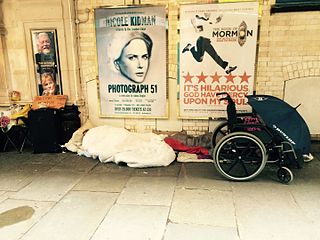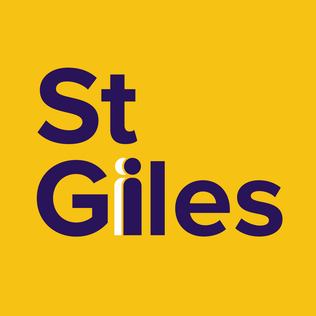
Sufra NW London is a community food and support hub based in Stonebridge ward in the London Borough of Brent. Their network of Food Banks and Community Kitchens across the London Borough of Brent act as gateway services that enable their beneficiaries to access a wider programme of activities designed to address the root causes of poverty and homelessness in the local area. Their wrap around support includes Welfare Advice, a Refugee Support Programme, an award-winning community food growing project - St. Raphael’s Edible Garden, and a range of AQA accredited training and employability courses.
Centrepoint is a charity in the United Kingdom which provides accommodation and support to homeless people aged 16–25. The Prince of Wales has been a patron of the organization since 2005; his first patronage. His mother Diana, Princess of Wales, was patron of the organization before she died.

Crisis is the UK national charity for people experiencing homelessness. The charity offers year-round education, employment, housing and well-being services from centres in East London, Newcastle, Oxford, Edinburgh, South Yorkshire, South Wales, Croydon, Brent and Merseyside, called Crisis Skylight Centres.
The Rough Sleepers Initiative was an initiative by the Government of the United Kingdom's Rough Sleepers Unit (RSU), which resulted from a campaign by St Mungo's, a London homelessness charity, called National Sleep Out Week. It was designed to accommodate homeless people with emergency hostels.

In England, local authorities have duties to homeless people under Part VII of the Housing Act 1996 as amended by the Homelessness Act 2002. There are five hurdles which a homeless person must overcome in order to qualify as statutory homeless. If an applicant only meets the first three of these tests Councils still have a duty to provide interim accommodation. However an applicant must satisfy all five for a Council to have to give an applicant "reasonable preference" on the social housing register. Even if a person passes these five tests councils have the ability to use the private rented sector to end their duty to a homeless person.
Housing First is a policy that offers unconditional, permanent housing as quickly as possible to homeless people, and other supportive services afterward. It was first discussed in the 1990s, and in the following decades became government policy in certain locations within the Western world. There is a substantial base of evidence showing that Housing First is both an effective solution to homelessness and a form of cost savings, as it also reduces the use of public services like hospitals, jails, and emergency shelters. Cities like Helsinki and Vienna in Europe have seen dramatic reductions in homelessness due to the adaptation of Housing First policies, as have the North American cities Columbus, Ohio, Salt Lake City, Utah, and Medicine Hat, Alberta.

Arlington House is a hostel for homeless men in Camden Town, London that opened in 1905.
Cardboard Citizens is the UK's only homeless people's professional theatre company, and the leading practitioner of Forum Theatre and the Theatre of the Oppressed methodology in the UK. The acclaimed theatre company works with people who have experience of homelessness or those at risk of becoming homeless to create theatre that makes a real and positive difference to society and those living in its margins.

Homelessness in the United Kingdom is measured and responded to in differing ways in England, Scotland, Wales and Northern Ireland but affects people living in every part of the UK's constituent countries.
Youth Off The Streets is an Australian non-denominational not-for-profit youth organisation. The organisation works with young people and their families and communities in an endeavour to create safety, offer support and provide opportunities to build a positive future.

St Giles Trust is a charity that works with people facing disadvantages such as homelessness, long-term unemployment, an offending background, addiction, severe poverty and involvement in gangs.
The Wild Goose Cafe is a project run by Crisis Centre Ministries, or 'CCM', a Christian-run local charity based in Bristol, England. They are a charity working to improve the lives of socially excluded homeless people and those with addiction problems. It was first established in 1986 by Derek Groves and was originally called 'The Missing Piece'.
Revolving Doors is a charitable organisation in the United Kingdom which works across England and Wales. Through research, policy and campaigning work, the organisation aims to improve services for people with multiple needs who are in repeat contact with the criminal justice system.

The St Mungo Community Housing Association, working as St Mungo's, is a charity registered in England to help homeless people.

Old Vic New Voices (OVNV) is The Old Vic’s Education, Community and Emerging Talent programme.

Pan is an intercultural arts organization and registered charity based in London, UK, that uses the arts to explore cultural diversity and social change. The main purpose of the organization is to help marginalised young people from all cultures and religions who are at risk of social exclusion to improve personal and interpersonal skills through a range of arts activities including drama, music, film, dance, creative writing and visual arts.
The Homeless Foundation is a registered charity based in the West Midlands with the aim of eradicating homelessness across the United Kingdom. It was founded in 2007 and is run by a board of trustees.
The Whitechapel Centre is a homeless day-centre and registered charity in Langsdale Street, Liverpool, England. Established in 1975, it works with people in the Liverpool and Sefton areas, offering advice and information about housing. The centre is open 12 hours a day for 365 days a year. From 2018 until the COVID-19 pandemic in March 2020, the Whitechapel Centre also offered a night shelter, Labre House.
The Museum of Homelessness is a community-driven social justice museum, based in London, and created and run by people with direct experience of homelessness.

Spitalfields Crypt Trust (SCT) is a charity in East London that supports people in recovery from addictions, homelessness, and other complex needs.









